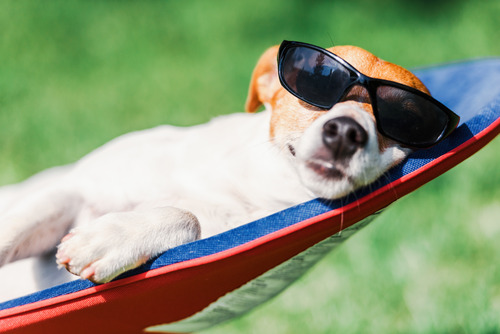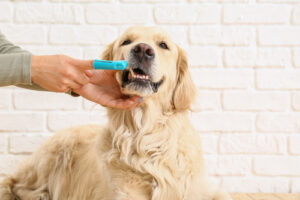Most pet owners know how important sun protection is for themselves, but many are surprised to learn that dogs can also experience the effects of sun exposure. Whether your pup enjoys long walks on the beach, lounging in the backyard, or riding along on outdoor adventures, their skin is still vulnerable to the sun’s rays. This raises an important question: do dogs really need sunscreen? In this blog, we’ll take a closer look at how sunlight affects dogs, when dog sunscreen might be necessary, and what factors pet owners should consider when protecting their canine companions. By the end of this blog, you’ll be better equipped to safeguard your dog’s health and comfort year-round. If you have questions about dog sunscreen or your pet’s skin health, call Dix Hills Animal Hospital at (631) 271-8383 or book an appointment online today.
Why Sun Protection Matters for Dogs
Dogs have fur that acts as a natural barrier, but it does not always provide complete protection from the sun. Just as people with fair skin are more susceptible to sunburn, certain dogs are at higher risk depending on their coat type, color, and lifestyle. When dogs spend extended time outside, they are exposed to ultraviolet (UV) rays that can affect their skin, eyes, and even long-term health.
Unlike humans, dogs may not show discomfort immediately when their skin is irritated, so pet owners may overlook early signs of sun damage. Repeated sunburn can cause pain and increase the risk of skin conditions, making proactive care important. This is where the concept of dog sunscreen comes in. By applying a specially formulated product, pet owners can help shield vulnerable areas of their dog’s body from harmful rays and reduce the chances of irritation or damage.
Which Dogs Benefit Most from Dog Sunscreen?
Not all dogs face the same level of risk from the sun. Certain breeds and coat types are more prone to sun sensitivity, and lifestyle also plays a major role.
Light-Colored or Thin-Coated Breeds
Dogs with white or light-colored fur and pink skin, such as Dalmatians, Pit Bulls, Whippets, and Boxers, are especially prone to sunburn. Thin coats do little to block UV rays, making dog sunscreen an added layer of protection.
Hairless Breeds
Breeds such as the Chinese Crested or Xoloitzcuintli have little to no fur coverage, which leaves their skin exposed. For these dogs, sun protection is particularly important.
Dogs That Spend Time Outdoors
Any dog that enjoys frequent sunbathing, hiking, or outdoor play is more at risk. Even darker-coated dogs can experience sun damage if they spend long hours outside, especially during peak daylight hours.
Areas Most Vulnerable to Sun Exposure
Dog sunscreen is not applied all over the coat but rather to areas with less fur coverage. Pet owners are often surprised at how many spots on their dog’s body can be vulnerable to sunlight.
Nose and Muzzle
The nose is a highly sensitive area with little to no fur. Dogs that enjoy sticking their heads out of car windows or digging in the yard can have their noses exposed to direct sunlight for long periods.
Ears
The tips and insides of a dog’s ears are thin and often unprotected. Floppy-eared breeds may have more natural coverage, but upright-eared dogs are more exposed.
Belly and Groin
When a dog lies on its back in the sun, the belly and inner thighs receive direct exposure. These areas typically have sparse fur, making them particularly vulnerable.
Paw Pads
While fur often shields the tops of the paws, paw pads can also face exposure on hot surfaces like sand or pavement. Although sunscreen is not always applied here, protecting paw health is part of overall sun safety.
The Difference Between Dog Sunscreen and Human Sunscreen
One of the most important things to know is that human sunscreen should not be used on dogs. Many human products contain zinc oxide, salicylates, or fragrances that can be toxic to pets if ingested. Since dogs often lick their skin and fur, it’s important that any sunscreen used is specifically made for dogs.
Dog sunscreen is formulated to be safe if licked in small amounts and designed to work with canine skin pH levels. These products often come in sprays, wipes, or balms, making application easier on active pets. Choosing a product labeled as safe for dogs ensures that you’re protecting your pet without introducing harmful chemicals.
Other Ways to Protect Dogs From the Sun
While dog sunscreen can help, it is just one part of sun safety. Pet owners should think about multiple strategies to reduce sun exposure.
- Shade and Shelter: Encouraging your dog to rest in shaded areas is one of the easiest and most effective ways to prevent sunburn. Whether at home or at the park, always provide access to shelter.
- Protective Clothing: Dog shirts, lightweight coats, or sun-protective vests can reduce UV exposure. These are especially helpful for short-haired or hairless breeds.
- Avoiding Peak Sun Hours: UV rays are strongest between 10 a.m. and 4 p.m. Planning walks or outdoor play before or after these times helps reduce risk.
- Paw Safety: Hot pavement and sand not only expose paws to heat but can cause discomfort or burns. Walking dogs on grass or using booties provides protection.
Dog sunscreen works best when combined with these additional steps to create a well-rounded approach to sun protection.
How Sun Exposure Affects Long-Term Health
Just like in people, long-term sun exposure can have lasting effects on dogs. Chronic sun damage can contribute to skin conditions, discomfort, and visible changes in skin texture or color. For some dogs, this risk is higher based on genetics, lifestyle, and age. Regular skin checks during grooming sessions or vet visits can help identify early signs of irritation or changes. By staying aware of how sunlight affects dogs, pet owners can better protect them and provide a more comfortable outdoor experience. Dog sunscreen may seem like a small step, but it can make a meaningful difference in long-term skin health.
When to Talk to Your Veterinarian About Dog Sunscreen
If you’re considering dog sunscreen for your pet, your veterinarian can provide guidance tailored to your dog’s breed, lifestyle, and overall health. Not every dog will need sunscreen every day, but for those at higher risk, it can be an important preventative measure.
Veterinarians can also recommend safe, pet-specific products and discuss other strategies for reducing sun exposure. This helps pet owners avoid products that may cause irritation or be unsafe for dogs to ingest. By consulting with your vet, you’ll gain peace of mind knowing you’re making the right choice for your pet’s well-being. For pet owners in Huntington, NY, the team at Dix Hills Animal Hospital is ready to help. Call (631) 271-8383 or book an appointment online today to talk about your dog’s skin care and outdoor safety.





